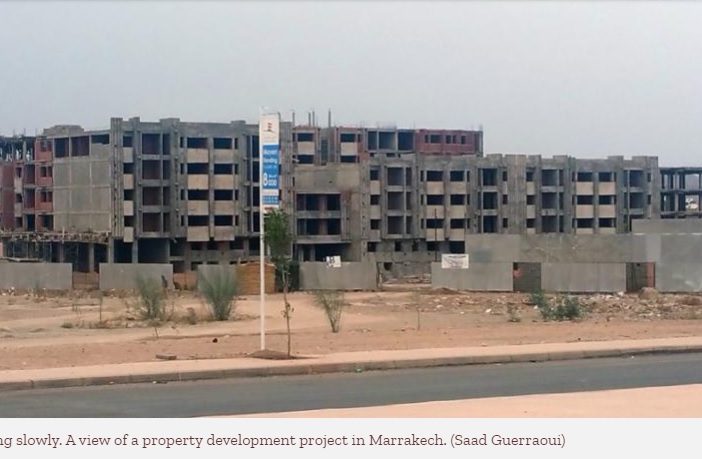The Arab Weekly
Saad Guerraoui
Demand for flats and houses dropped 7% from April-June while supply rose 86% in new real estate and 30% in old real estate in the first half of 2019.
The real estate market in Morocco is slowing amid a sluggish national economy and experts called on the government to help revive the vital job-providing sector.
The first half of 2019 saw a slowdown in demand amid a decline in transactions that is taking its toll on unsold properties and construction projects that have been left at a standstill, the Real Estate Guide released by Mubawab, a website specialising in real estate activity, stated.
Demand for flats and houses dropped 7% from April-June while supply rose 86% in new real estate and 30% in old real estate in the first half of 2019, the report said. Real estate transactions fell 8% in the second quarter of this year compared with the second quarter of 2018, Morocco’s central bank said.
All major real estate development companies posted a fall in net profits in the first half of 2019. The net results of Residences Dar Saada, Alliances and Addoha declined 17.1%, 8.6% and 17.4%, respectively.
Addoha, Morocco’s leading real estate development company, lost 48% of its value since the beginning of the year, followed by Residences Dar Saada with 39% and Alliances with 31% drops.
“Property developers are watching with concern the sluggish demand that has borne the brunt of an economic slowdown,” financial expert Mehdi El Fakir said. “What we are witnessing now is the liquidation of property stocks in the market rather than major construction projects.”
The real estate sector is the second-largest job provider in Morocco with more than 1 million workers.
Jad Aboulachbal, a notary in Casablanca, called on the government to act to revive the real estate market.
“Registration and conservation fees for acquiring a property are some of the obstacles hindering people from buying properties. The government needs to bring these fees back to their previous levels,” Aboulachbal said.
The government raised the fees three years ago despite notaries’ complaint that it would affect demand for properties.
Another major drawback is the property price reference system imposed by the Finance Ministry almost five years ago to fight “black money” in real estate transactions.
“There are many property owners who cannot sell or hesitate to sell their properties for fear of being fined by the tax authorities because the selling price is below the reference,” said Aboulachbal.
“The problem with the price reference system is that it is not really connected with the reality of the real estate market, which means that selling prices are lower than the fixed reference pricing.”
The new price reference system went into force July 1 to better reflect the reality of the real estate market. The General Directorate of Taxes said the system would be constantly fine-tuned, leading to a benchmark reflecting the real value of each property.
“We can say that a reference pricing adapted to the current real estate market would be welcomed,” said Aboulachbal.
However, the new system, which involves 54 cities across Morocco, does not fully cover all streets and municipalities in the same city.
The high-end real estate market has been hit the hardest in major cities such as Casablanca and Rabat, forcing developers to drastically lower prices.
“My flats in Casablanca are selling slowly because demand for high-end real estate [market] has dramatically fallen,” said property developer Bouchaib Bessat.
“I brought my properties’ prices down to 15% in Casablanca to be able to sell them. In the past, I sold some projects within a year. Now it’s taking me more than four years to sell my properties.”

Written BySaad Guerraoui
Saad Guerraoui is a regular contributor to The Arab Weekly on Maghreb issues.







